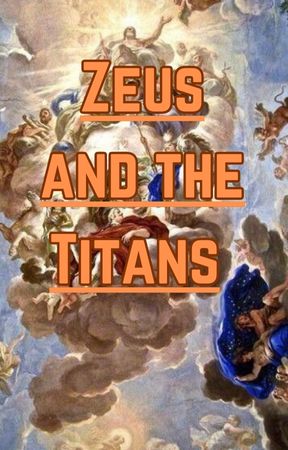The story of Zeus and the Titans is an essential part of Greek mythology. It revolves around a struggle for power between the Titans, the older generation of divine beings, and the Olympians, led by Zeus. Here’s an abridged version of the tale:
Long ago, the world was ruled by the Titans, a race of powerful and ancient gods. They were led by Cronus, the Titan King, who had overthrown his own father, Uranus, to claim the throne.
However, a prophecy had foretold that Cronus would be overthrown by one of his own children, just as he had done to his father. To prevent this from happening, Cronus swallowed each of his children as they were born, imprisoning them within him. His wife, Rhea, grieved for her lost children and desperately wanted to save their youngest son, Zeus.
When Rhea was about to give birth to Zeus, she sought the counsel of her parents, the Titans Oceanus and Tethys. They advised her to protect the child and sent her to a secret cave on the island of Crete to give birth in secret.
In the cave, Rhea gave birth to Zeus and devised a plan to save him from Cronus’ grasp. She wrapped a stone in swaddling clothes to mimic a baby and presented it to Cronus, who, without suspicion, swallowed the stone, thinking it was his newborn son.
Meanwhile, Zeus was raised in secret on Crete, hidden from his father’s sight. As he grew older, he became stronger and wiser, aware of his true identity and destiny. He knew he had to confront Cronus and the Titans to claim his rightful place as the ruler of the gods.
With the help of his mother Rhea and the Titaness Metis, Zeus returned to Mount Olympus, the realm of the gods. He disguised himself as a cupbearer and served Cronus a drink that contained a powerful emetic. The potion made Cronus vomit, and one by one, Zeus’s siblings were released from his father’s belly.
Freed from their captivity, Zeus and his siblings, Poseidon, Hades, Hera, Hestia, and Demeter, allied with other Titans who opposed Cronus. They waged a mighty war against the Titans, known as the Titanomachy.
The Titanomachy was a fierce and prolonged battle, but eventually, Zeus and the Olympians emerged victorious, thanks in part to the aid of the Cyclopes and the Hecatonchires, who had been imprisoned by Cronus. As a reward for their help, Zeus released the Cyclopes and the Hecatonchires and gave them a place of honor in his new order.
Zeus banished Cronus and the other defeated Titans to Tartarus, a deep and dark abyss within the Underworld. There, the Titans were imprisoned for all eternity, and Zeus established his reign as the king of the gods, ruling from Mount Olympus.
With the Titans vanquished, Zeus and the Olympians became the new dominant pantheon in Greek mythology, and Zeus, the mighty god of thunder and sky, became the supreme ruler of the cosmos.
The story of Zeus and the Titans serves as a significant mythological tale that explains the rise of the Olympian gods and the establishment of Zeus as the most powerful deity in Greek mythology.







